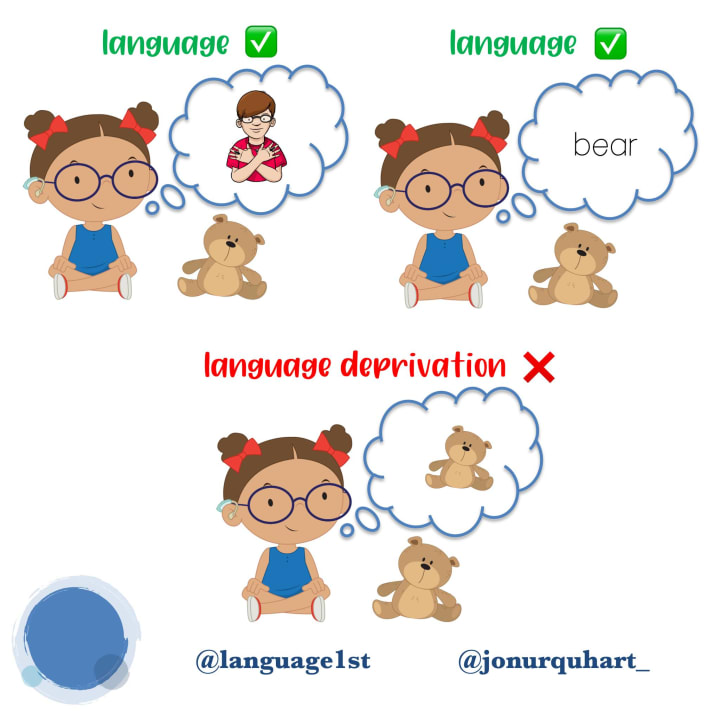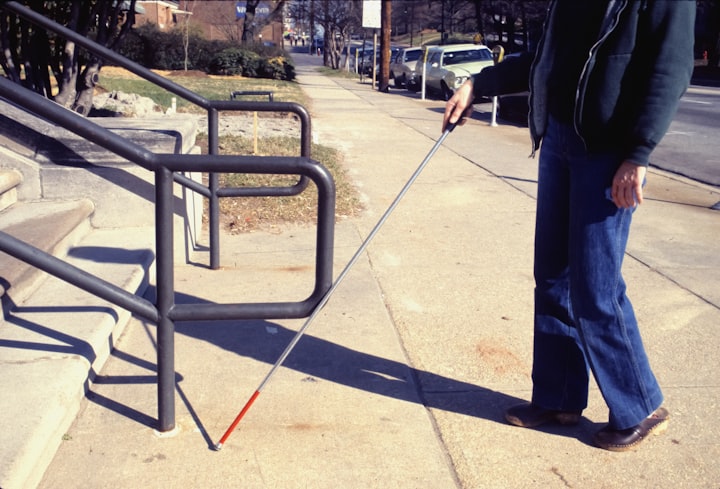Stolen Futures: Language Deprivation & Deaf Children
Understanding the impact of Language Deprevation has on Deaf children.

The education of deaf children is a topic close to my heart, and I know many other Deaf adults in the community feel the same. However, our experiences, research, and insights are often dismissed by hearing parents, medical professionals, and educational institutions.
Let's explore language deprivation and its impact on both Deaf children and their families.
What is language deprivation?
Language deprivation occurs when deaf children lack access to a full and accessible language during the critical development period, typically from birth to 5 years old.
This can happen for several reasons, some of these are:
- Limited or no exposure to an accessible language - Sign languages like American Sign Language (ASL) is a visual language with its own grammar and syntax. Without access to ASL, deaf children miss out on this crucial language input.
- Inadequate auditory access - Even with hearing aids or cochlear implants, spoken language might still be unclear for some deaf children. This makes it difficult to acquire the nuances of speech, hindering their ability to rely solely on spoken language for development.
- Delayed Diagnosis - Delays in diagnosing hearing loss can lead to critical periods of missed language exposure. Even after an initial diagnosis, medical professionals often recommend multiple retests over several months before confirming hearing loss, wasting precious time that could be spent learning sign language.
- Lack of Awareness - Families may not be aware of the importance of early language acquisition or how to effectively communicate with their deaf child.
This lack of an accessible language significantly impacts a deaf child's development in several areas:
- Literacy: Language skills are the foundation for literacy in any language, including sign languages. Language deprivation can hinder a deaf child's ability to learn to read and write.
- Cognitive development: Language plays a vital role in thinking, reasoning, and problem-solving. Deprivation can negatively impact cognitive development in deaf children.
- Social and emotional well-being: Communication is essential for building relationships and expressing emotions. Language deprivation can create challenges in these areas for deaf children.
Research by the National Association of the Deaf (NAD) suggests a concerning prevalence of language deprivation affecting up to 70% of deaf children. This PBS special explains more on language deprivation.
The impact on Deaf children
Imagine entering kindergarten knowing only around 50 to 100 words or not even knowing your own name. The average kindergartener knows about 2,100 and 2,200 words - the deaf child is woefully behind.
This limited vocabulary doesn't just impact their reading and writing, but also many other areas of their lives.
The impact on their cognitive abilities can be:
- Cognitive delays in learning.
- Having a hard time expressing themselves in all areas - spoken, signed, written.
- Not understanding abstract concepts.
- Not having the ability to arrange narratives in a linear sequence.
- Not understanding constructs such as cause and effect.
- Struggling with planning and time management.
The impact on their emotional and mental wellbeing can be:
- Having difficulty developing a sense of Self.
- Experiencing disconnection with one's family, cultural roots and identity.
- Experiencing difficulty in forming connectons and relationships with both their deaf and hearing peers and their family.
- Tending to have more emotional outbursts, which can lead to getting into trouble with authorities.
Understanding a handful of English words, or a few signs does not equate to having a "language".
Mastery of language requires one to be able to fill out job applications or even a disability benefits application. It requires one to be able to read street signs, read instructions, follow a recipe, find information, and to communicate with other people.
Imagine being stuck in a foreign country - you only know a handful of the native language with no access to your own language. You have to live with them, go to school, go to work and tend to your daily activities in that foreign language.
Sure, you're smart and can figure out the language quickly by listening and comparing spoken words right? You overhear people talking, the radio, the TV? Now put on noise-cancelling headphones and there goes all your incidental learning. Now what? You try and form relationships by asking how someone is and all they do is smile and give you a thumbs up. Yeah, sucks doesn't it?
These impacts, of course, exist on a spectrum ranging from mild to severe.
Here's an example of language deprivation. Many people have praised this mom, but these commenters do not know ASL and do not see that the child is just "parroting" her signing. I, and many other fluent Deaf people, see that there's little language understanding happening - thus its not viable communication.
Deaf children are adept at "masking"
Before parents and school professionals jump on me saying "My deaf child does well in school!" "They don't need accommodations, they understand everything going on". Let me fill you in on a secret - deaf children are skilled at hiding the fact that they haven't understood something.
Why do deaf children do this?
- Fear of appearing different - They already are obvious to the fact that they stand out from their peers with their deafness. They want to minimize this by agreeing to their surroundings.
- Pressure to keep up - They don't want to slow the class down by asking for clarification (or asking for repetition).
- Difficulty expressing their needs - They may not have the vocabulary, confidence, or self-empowerment to express their confusion.
What does masking look like?
- Feigning understanding - They might nod along or say "yes" even if they haven't understood. They'll look at the board, or peek at a peer's book to see where they're at. After school they may study extra hard to try and understand on their own.
- Behavior - They might become withdrawn, frustrated, or act out. They could also feign happiness and interest in what's happening around them while trying to control the sensory overload.
- Mirroring - They watch their surroundings closely and mimic behavior and action. With friends, they may not understand what's spoken, but they'll laugh when others do, cry when others do, and so on.
- Tiredness - They will be more tired than usual, this is from having to listen and lipread, fill in the missing information, and then process a response. I explain this further in my other article, When Words Get Tiring.
This masking is a survival skill and often carries into adulthood.
The effect on their hearing families
The effect of a deaf child's language deprivation on the hearing family first and foremost is the amount of frustration on both sides. The frustration at the inability to communicate and to be understood.
Maybe your child does awesome one-on-one and carries on conversations easily this way, but when it comes to the whole family at the dinner table or attending a family reunion - they suddenly cannot follow what's going on.
This was my youth. I was raised orally, I could speak and had hearing aids. I could carry on a conversation one-on-one with some repetition, but as soon as there was a group, I was lost. Sometimes I'd ask what was going on, sometimes a family member would relay what happened, other times I got the "never mind", "I'll tell you later", "it's not important" runaround. Ask a Deaf adult and many will nod in agreement that this happened to them as well.
Another example of language deprivation as explained by a former teacher of the Deaf, Rachel Zemach, author of "The Butterfly Cage" is that deaf children do not know or understand familial connections.
As many deaf children grow up many recognize the lack of real connection to family. Many start drifting away, or even severing ties - to them, the lack of family bonds is like being with strangers.
Would you spend your holiday breaks with a group of strangers who can barely communicate with you?
Over the years I've noticed some parents give excuses about not learning sign language, citing difficulty or time constraints. However, the deaf child misses out on school and social interactions while they focus on speech therapy sessions.
Being deaf or hard of hearing isn't just a lack of hearing - its a lack of connection.
Let's meet in the middle
It's been proven that learning sign language at birth does not harm learning the home's natural spoken language. The deaf child can learn to sign as early as 6 - 8 months old and pick up so much vocabulary before a hearing child learns to speak their first word.
I raised 2 hearing children and they signed since they were 8 months old. Before they were two, they knew the difference between a cut, a bruise, or a scratch while their speaking playmates were still uttering "a boo-boo" to describe an accident.
When a deaf child has a visual language, they can:
- Connect an object and its sign
- Learn the written word
- Learn the spoken word

Many medical professionals today still insist the deaf child learn to speak first because "the child will use sign language as a crutch and not learn to speak". It's akin to saying don't let your child use a wheelchair - they'll need to work hard to make their legs work. Does this make sense?
To get started, many States have a Deaf Mentor program available at the State School for the Deaf or related Agency serving the Deaf. These mentors will go and meet with the family, teach sign language, answer parents questions, share their personal experiences, about Deaf Culture and much more.
Make the road easier for your deaf child and learn ASL as soon as you find out they are deaf or hard of hearing. From there you can teach them to write, then learn to speak. Emerge the child and your family in Deaf Culture - attend Deaf events in your area, join a Parents of Deaf Children group, attend signed storytime in your local area or even online.
The child will have ASL and English tools to use and enjoy the best of both worlds and celebrate both cultures.
When the child is old enough to make decisions, they can decide which "world" they want to gravitate to and which listening tools they want to use.
Being deaf is not a horrible thing in itself. However, the isolation and missed opportunities that can come from it are truly horrible.

About the Creator
Tracy Stine
Freelance Writer. ASL Teacher. Disability Advocate. Deafblind. Snarky.
Enjoyed the story? Support the Creator.
Subscribe for free to receive all their stories in your feed. You could also pledge your support or give them a one-off tip, letting them know you appreciate their work.






Comments (1)
Excellent article!!! Wonderful advice!!! Loved it!!!💕❤️❤️